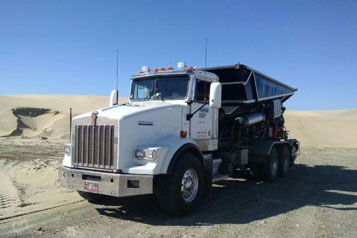Utility Construction
Entry-Level
Job Description:
Assist construction activities with a variety of basic tasks. Load, unload, or identify building materials, machinery, or tools, distributing them to the appropriate locations.
Skill Set:
- Knowledge of arithmetic, algebra, geometry, and their applications.
- Understanding written sentences and paragraphs in work related documents.
- Learn and follow safety regulations.
- Clean or prepare construction sites to eliminate possible hazards.
- Dig ditches or trenches, backfill excavations, or compact and level earth to grade specifications, using picks, shovels, pneumatic tampers, or rakes.
- Tend pumps, compressors, or generators to provide power for tools, machinery, or equipment.
- Work as a team. Be aware of others’ reactions and understand the dynamics of worker relationships.
- Giving full attention to what other people are saying, taking time to understand the points being made, asking questions as appropriate, and not interrupting at inappropriate times.
- Communicate with others to convey information effectively
Mid-Level
Job Description:
Coordinate activities of workers engaged in utility installation for projects such as highways, streets, and site development.
Skill Set:
- Ability to read and interpret documents such as safety rules, operating and maintenance instructions, and procedure manuals.
- Ability to add, subtract, multiply, and divide in all units of measure, using whole numbers, common fractions, and decimals.
- Read grade stakes and understand their meaning.
- Knowledge of basic equipment functions and production rates.
- Measure, mark, or record openings or distances to layout areas where construction work will be performed.
- Ability to carry out instructions furnished in written, oral, or diagram form.
- Install or repair sanitary or storm water sewer structures or pipe systems
- Use instruments such as lasers, grade rods, or transit levels.
- Check slopes for conformance to requirements, using levels or lasers.
- Lay out pipe routes, following written instructions or blueprints and coordinating layouts with supervisors.
- Grade or level trench bases, using tamping machines or hand tools.
- Operate equipment, such as bulldozers, trench excavators, road graders, or backhoes.
Lead
Job Description:
Supervise, train and coordinate the workers in the utility department.
Skill Set:
- Supervise, coordinate, or schedule construction activities.
- Read specifications, such as blueprints, to determine construction requirements or to plan procedures.
- Inspect work progress, equipment, or construction sites to verify safety or to ensure that specifications are met.
- Estimate material or worker requirements to complete jobs.
- Assign work to employees. based on material or worker requirements of specific jobs.
- Confer with other departments, or contractors to resolve problems or to coordinate activities.
- Analyze worker or production problems and recommend solutions, such as improving production methods.
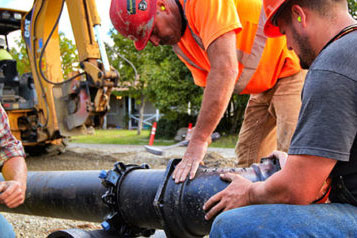
Earth Work/Excavation
Entry-Level
Job Description:
Assist construction activities with a variety of basic tasks. Load, unload, or identify building materials, machinery, or tools, distributing them to the appropriate locations.
Skill Set:
- Knowledge of arithmetic, algebra, geometry, and their applications.
- Understanding written sentences and paragraphs in work related documents.
- Learn and follow safety regulations.
- Clean or prepare construction sites to eliminate possible hazards.
- Dig ditches or trenches, backfill excavations, or compact and level earth to grade specifications, using picks, shovels, pneumatic tampers, or rakes.
- Tend pumps, compressors, or generators to provide power for tools, machinery, or equipment.
- Work as a team. Be aware of others’ reactions and understand the dynamics of work relationships.
- Giving full attention to what other people are saying, taking time to understand the points being made, asking questions as appropriate.
- Communicate with others to convey information effectively.
Mid-Level
Job Description:
Coordinate activities of workers engaged in excavating and grading right-of-way for construction of projects such as highways, streets, drainage ditches, and site development.
Skill Set:
- Ability to read and interpret documents such as safety rules, operating and maintenance instructions, and procedure manuals.
- Ability to add, subtract, multiply, and divide in all units of measure, using whole numbers, common fractions, and decimals.
- Read grade stakes and understand their meaning.
- Knowledge of basic equipment functions, and production rates.
- Measure, mark, or record openings or distances to layout areas where construction work will be performed.
- Ability to carry out instructions furnished in written, oral, or diagram form.
- Monitor operations to ensure that health and safety standards are met.
- Operate equipment, such as bulldozers, trench excavators, road graders, or backhoes.
- Load and move dirt, rock, equipment, or other materials using trucks, crawler tractors, power cranes, shovels, graders, or related equipment.
- Coordinate machine actions with other activities, positioning or moving loads in response to hand or audio signals from crew members.
- Set grade and slope stakes to communicate cut and fill depths.
- Measures distances from reference points to locate boundaries of construction site.
- Resolve line and grade conflicts between plans and existing conditions with inspectors and/or owner.
- Direct and train crew members on the correct processes, construction methods, and equipment operating procedures, including maintenance.
Lead
Job Description:
Supervise, train and coordinate the workers in the construction excavation department.
Skill Set:
- Supervise, coordinate, or schedule the activities of construction activities.
- Read specifications, such as blueprints, to determine construction requirements or to plan procedures.
- Inspect work progress, equipment, or construction sites to verify safety or to ensure that specifications are met.
- Estimate material or worker requirements to complete jobs.
- Assign work to employees based on material or worker requirements of specific jobs.
- Confer with other departments or contractors to resolve problems or to coordinate activities.
- Analyze worker or production problems and recommend solutions, such as improving production methods.
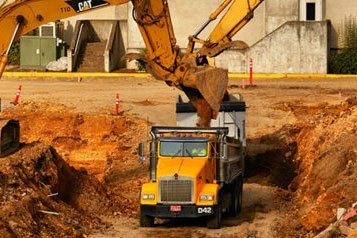
Rock Crusher Miner
Job Description
A plant operator handles all the cleaning and repairs for the rock crushing operation. Plant operators handle everyday tasks such as making sure conveyors are lubed, floors are free from debris, and machinery and other important devices are cleaned and maintained. Plant operators sometimes operate heavy equipment.
Basics
Mining operations consist of extracting aggregate deposited from the Willamette River. Equipment operators excavate raw materials and distribute them to the plant to be processed into consumable products. Plant operator must maintain and construct various conveyor belts and rock crushers.
Skills
Plant operators must be able to follow directions and schematics, used to assist in operational changes. Operators need strong technical skills to make general repairs which often include welding. They also need sound analytical and mathematical abilities. They should be strong communicators, ably taking in and relaying important maintenance information to supervisors and other repairmen.
Background
Most plant operators can be trained on the job, provided they possess a high school diploma and strong work ethic. Candidates with vocational skills in welding and mechanics are preferred. Areas of study for operators typically include technical drawing, science and math.
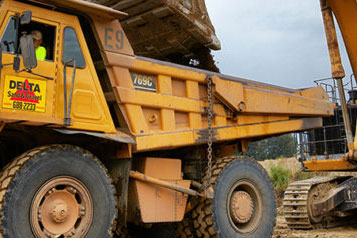
Heavy Equipment Diesel Mechanic
Job Description
A heavy equipment mechanic must know how to properly maintain and repair the equipment. Mechanics work not only on diesel engines but may work on construction equipment maintaining the hydraulic, and electrical systems.
Function
A heavy equipment mechanic needs a good understanding of how diesel engines work. Diesel mechanics work to keep engines in top repair. A heavy equipment mechanic not only works on engines, but on the working parts of the equipment as well. This may involve working on a variety of pieces of equipment, such as earth movers, excavators, bulldozers, cranes and rollers. In addition to repair work, routine maintenance is part of the job.
Work Conditions
While a heavy equipment mechanic may have the opportunity to do some of the work inside a shop, much of the work as a equipment mechanic involves work on job sites in all types of weather. This keeps the mechanic on his feet most of the working day. Some of the work is in cramped spots, while other work may be from ladders.
Safety
It’s necessary to wear personal protective equipment (PPE) at all times. Safety rules are in place and all employees must follow them. The heavy equipment mechanic must also follow safety rules for working on engines.
Training
Preparation for the job begins in high school with mathematics, physics, chemistry and industrial technology courses. On-the-job training opportunities are available, but it’s easier and faster to learn the necessary job skills by attending a vocational school or community college that offers diesel mechanic training or heavy equipment training. The two-year course of study not only offers an associate’s degree but also provides hands-on training.
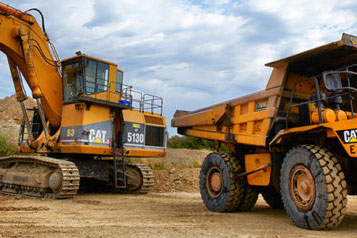
Concrete Construction
Entry-Level
Job Description
Assist construction activities with a variety of basic tasks. Load, unload, or identify building materials, machinery, or tools, distributing them to the appropriate locations.
Skill Set
- Knowledge of arithmetic, algebra, geometry, and their applications.
- Understanding written sentences and paragraphs in work related documents.
- Learn and follow safety regulations.
- Clean or prepare construction sites to eliminate possible hazards.
- Establish grades using picks, shovels, pneumatic tampers, or rakes.
- Tend pumps, compressors, or generators to provide power for tools, machinery, or equipment.
- Work as a team. Be aware of others’ reactions and understand the dynamics of worker relationships.
- Giving full attention to what other people are saying, taking time to understand the points being made, asking questions as appropriate.
- Communicate with others to convey information effectively.
Mid-Level
Job Description
Coordinate activities of workers engaged in concrete installation for projects such as highways, streets, and hardscapes.
Skill Set
- Ability to read and interpret documents such as safety rules, operating and maintenance instructions, and procedure manuals.
- Ability to add, subtract, multiply, and divide in all units of measure.
- Knowledge of basic equipment functions and production rates.
- Measure, mark, or record openings or distances to layout areas where construction work will be performed.
- Ability to carry out instructions furnished in written, oral, or diagram form.
- Monitor operations to ensure that health and safety standards are met.
- Signal truck drivers to position trucks to facilitate pouring concrete and move chute to direct concrete in forms.
- Direct the casting of the concrete and supervise laborers who use shovels or special tools to spread it.
- Set the forms that hold concrete to the desired pitch, depth and align them.
- Check the forms that hold the concrete to see that they are properly constructed.
- Spread, level, and smooth concrete using rake, shovel, hand or power trowel, hand or power screed, and float.
- Monitor how the wind, heat, or cold affect the curing of the concrete throughout the entire process.
- Apply hardening and sealing compounds to cure surface of concrete and waterproof or restore surface.
Lead
Job Description
Supervise, train and coordinate the workers in the concrete department.
Skill Set
- Supervise, coordinate, or schedule construction activities.
- Read specifications, such as blueprints, to determine construction requirements or to plan procedures.
- Inspect work progress, equipment, or construction sites to verify safety or to ensure that specifications are met.
- Estimate material or worker requirements to complete jobs.
- Assign work to employees, based on material or worker requirements of specific jobs.
- Confer with other departments or contractors to resolve problems or to coordinate activities.
- Analyze worker or production problems and recommend solutions, such as improving production methods.
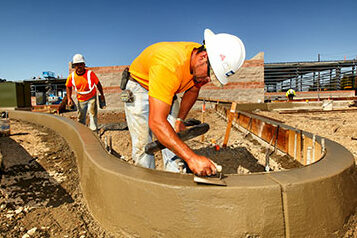
Truck Driver
Job Description
Truck drivers at Delta transport loose materials in different styles of trucks and trailers. These materials normally include dirt, rock, sand, and gravel.
Skill Requirements
Good coordination skills are required for a driver to operate the controls in the cab of their truck that manipulate the bed, pup and/or transfer trailer. They must have a good understanding of math and angles to properly position the bed to dump materials in measured amounts. Their regular and peripheral vision needs to be sharp to be aware of other trucks and of the heavy equipment that frequently surrounds them at job sites.
Job Duties
Hauling material from one place to another is the main job of a driver. They must follow a schedule for pickups and deliveries of materials. They are required to verify the types of materials they are hauling as well as their weight. If they are working in conjunction with other equipment operators and truck drivers, they must clearly communicate with them to make sure they deliver the materials according to the job specifications and timetables. They are expected to keep their truck clean and in good working order.
Working Conditions
Since a driver typically delivers dirt and other loose, natural materials, their environment is normally full of dust. Delta’s drivers typically travel locally to and from construction and renovation sites. Their workday generally begins early and may stretch into early evening, depending on job deadlines. Occasional overnight travel may be required.
Educational Requirements
To drive requires specialized training. This can be obtained through on-the-job training. A good command of written and oral English is a typical job requirement. Knowledge gained through driving other types of trucks or heavy equipment is desirable with a preference for CDL holders.
Delta is a drug free environment and drug screening is required for employment. Random drug screen occurs.
